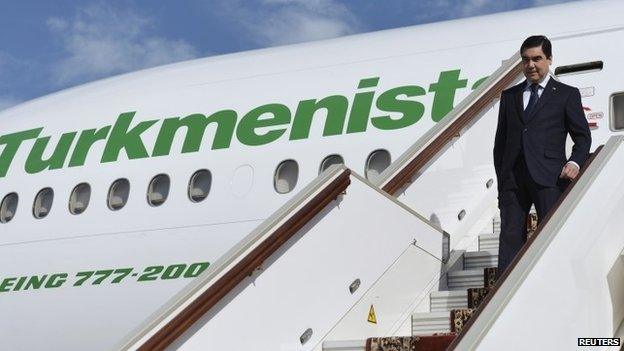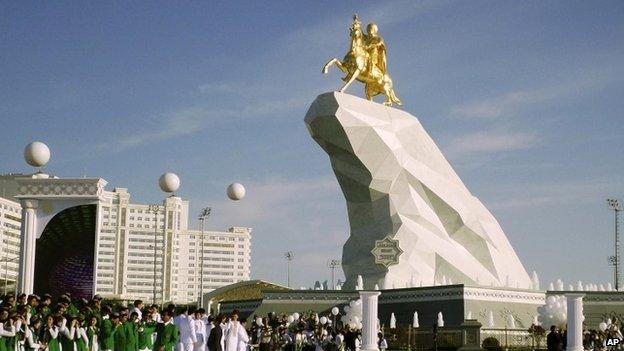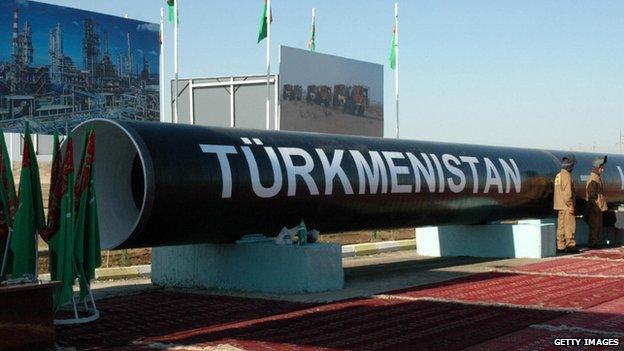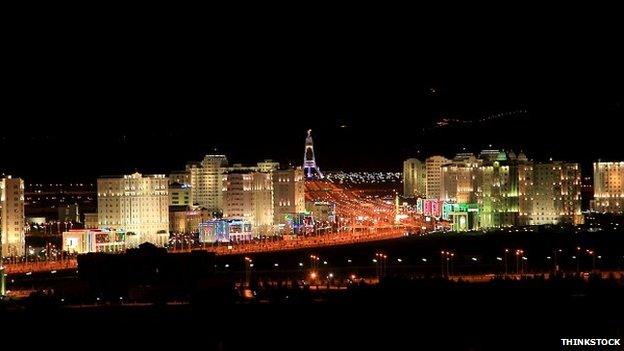Is Turkmenistan's gas line a pipe dream? (original) (raw)
For many, the Turkmenistan-Afghanistan-Pakistan-India (Tapi) gas pipeline is nothing but a pipe dream.
Its starting point is in Turkmenistan, one of the most isolated and closed-for-business states in the world, before it goes through war-torn Afghanistan and then reaches two countries that are hard to describe as partners - Pakistan and India.
However, Turkmenistan insists that the pipeline's construction will start by the end of 2015. The visit in May of Pakistani Prime Minister Nawaz Sharif to Ashgabat seemed to confirm this - both sides pledged to put fast track the project.
Likewise the recent visit of Indian Prime Minister Narendra Modi to Turkmenistan is also being seen as a boost to the project.
Why is the pipeline so crucial?
The proposed 1,735km-long (1,078-mile) pipeline will carry 33 billion cubic meters (bcm) of gas a year from Galkynysh, making it one of the world's biggest onshore gas fields.
 Image source, Reuters
Image source, Reuters
Pakistan and India will each get 42% of that volume - the rest will be purchased by Afghanistan.
The US strongly supports the pipeline plan, calling it "a transformative project for the entire region".
If implemented, it will help to attract much-needed investment to Afghanistan, increasing budget revenues through transit fees and contribute to the country's overall development.
The project is also crucial for India and Pakistan who are both facing severe energy shortages.
By 2020-21, demand for gas in India is expected to double and according to the Oxford Institute for Energy Studies, demand for gas in Pakistan over roughly the same timeframe will be three times higher than supply.
Turkmenistan is keen to implement this project in order to diversify its export routes and decrease its dependency on China.
At the moment Beijing is the main buyer of the Turkmen gas and by 2020 it will import two times more Turkmen gas than now.
What has been completed so far?
The Asian Development Bank has sponsored the feasibility study, the route has been mapped and the source field has been determined.
 Image source, AP
Image source, AP
On the commercial side, there have been significant achievements.
TurkmenGaz, Afghan Gas Enterprise, Inter State Gas Systems (Pakistan) and GAIL (India) are all equal shareholders in the Tapi Pipeline Company which will build, own and operate the pipeline.
All countries involved in the project have signed a gas sale and purchase agreement.
Who will pay for construction of the pipeline?
This is one of the main issues that remain unresolved.
 Image source, Getty Images
Image source, Getty Images
It is not clear who will finance the project that is estimated to cost $10bn.
The Pakistani and Indian governments show no indication that they can pay for the pipeline.
None of the four energy companies that formed the consortium has enough resources to fund the construction.
 Image source, Thinkstock
Image source, Thinkstock
Image caption,
Turkmenistan has the world's fourth-largest gas reserves
They have debated from the very beginning about inviting a global energy giant to finance the project in the form of a private company with sufficient funds and expertise.
Chevron, Exxon Mobil, Total and a few others have been mentioned as possible companies who could get involved.
However, all these companies have demanded a share in developing the gas field if they are to take the risk of financing it.
Construction of the pipeline is a costly and risky venture, and companies want to make sure that they will make enough money in order to return their investments and make a profit.
"You don't really make money from operating a pipeline," energy specialist John Roberts said. "You make money from developing a gas field and being able to export the gas."
The problem is that Turkmenistan refuses to let any foreign company have a stake in its gas fields.
It says that these are national resources and the government should be able to control them fully.
Only China has direct access to Turkmenistan's onshore gas fields but in return China has been investing billions of dollars into Turkmenistan and fully financed the construction of the Turkmenistan-China gas pipeline.
As a result of Turkmenistan's position, all major Western energy companies are losing their interest in the Tapi project.
One indication of that was the fact that they did not have prominent representation at Turkmenistan's major international gas congress held in May.
Is there a danger that Pakistan could turn off gas to India?
Security issues may not be the only obstacles to shipping gas through Tapi.
It seems there is no coherent mechanism in place to prevent participating states from using the pipeline as political leverage against neighbours, particularly if there is a dispute between Pakistan and India.
Turkmenistan's approach is to sell its gas at its border and argue that it is not responsible for whatever happens afterwards, says John Roberts.
So it is not clear who will ensure that Pakistan will not cut off the gas flow into India if there is a new wave of tension between the two countries.
The Asian Development Bank, the transaction adviser of this project, gave a somewhat vague answer when approached by the BBC.
"We believe all parties will be actively working to ensure that gas flows cannot be manipulated for political advantage and they will put in place suitable mechanisms to deter adequately the temptation to do so."
How safe is it to have a pipeline across Afghanistan?
Security issues are another major challenge for this project. More than 700km of the pipeline will cross through Afghanistan, including Helmand and Kandahar provinces that are traditionally considered to be Taliban strongholds.
The Afghan government has promised to provide troops to protect the pipeline.
However, with the end of Nato's operation, the security situation seems to be deteriorating. Recent reports about clashes near the Turkmen-Afghan border and the Taliban gaining strength in the north makes the project even less attractive for investors.
The pipeline was expected to be operational from 2017 but has been pushed back to 2018. Recently, Afghan President Ashraf Ghani said that the pipeline would not be completed in the next five years, casting even more doubt on its future.
So a combination of security issues and financial questions means that there is a long way to go before the Tapi project gets off the ground.
The way Turkmenistan deals with the financial problems in particular will have a direct impact on its other projects, including the construction of the Trans-Caspian pipeline that is projected to ship Turkmen gas to Europe.
If Turkmenistan refuses to let foreign companies have direct access to its gas fields, those other projects are - like the Tapi project - in danger of remaining pipe dreams.
Related internet links
The BBC is not responsible for the content of external sites.